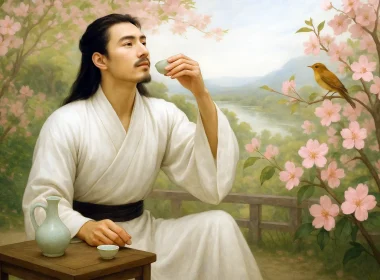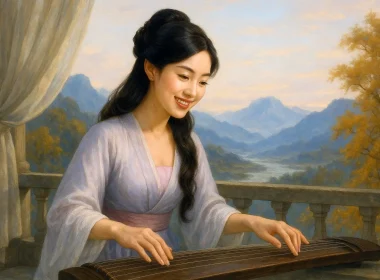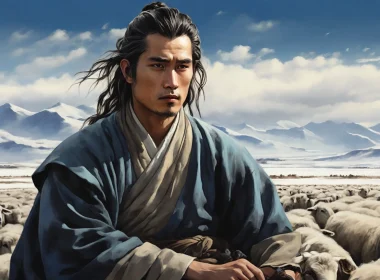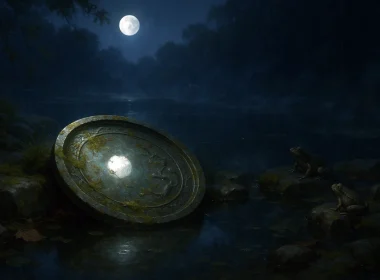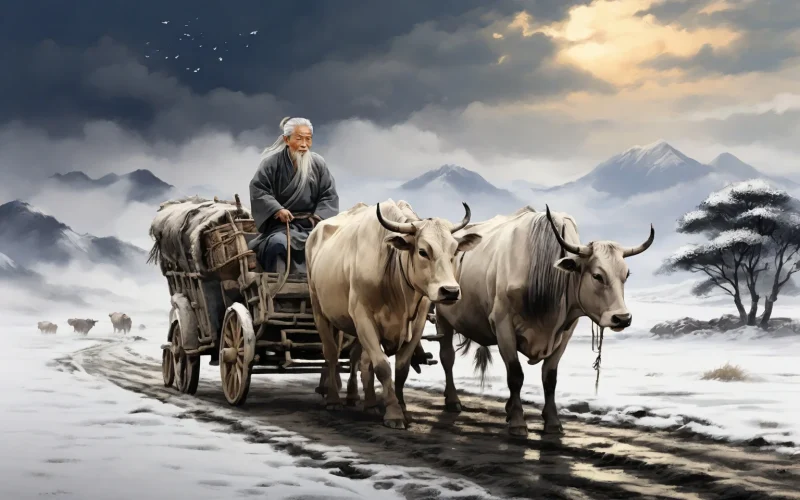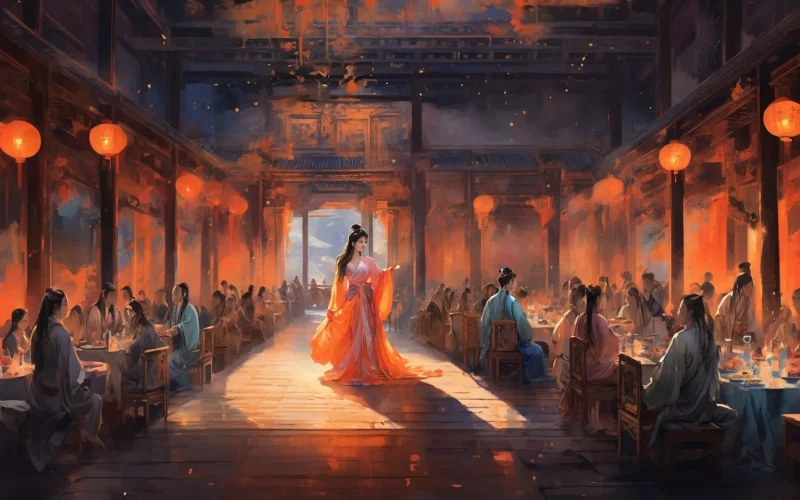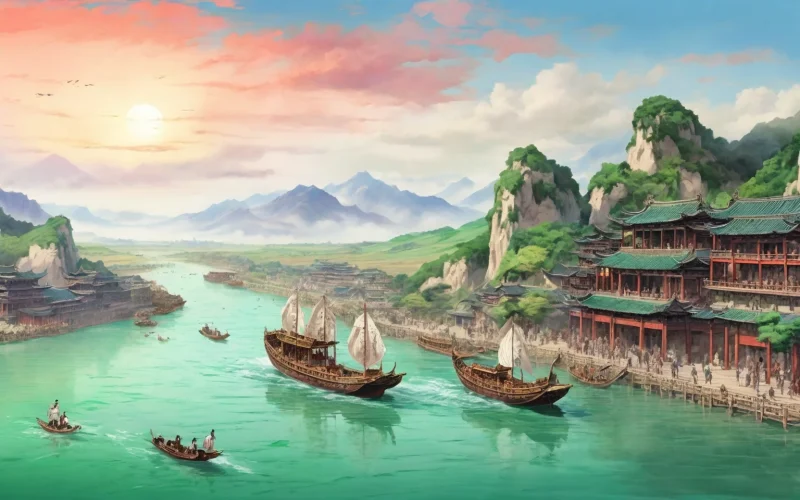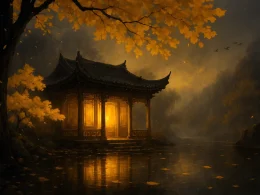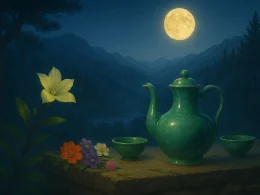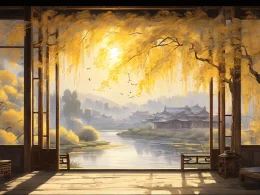What does the old man fare?
He cuts the wood in southern hill and fires his ware.
His face is grimed with smoke and streaked with ash and dust,
His temples grizzled and his fingers all turned black.
The money earned by selling charcoal is not just
Enough for food for his mouth and clothing for his back.
Though his coat is thin, he hopes winter will set in,
For cold weather will keep up the charcoals good price.
At night a foot of snow falls outside city walls;
At dawn his charcoal cart crushes ruts in the ice.
The sun is high, the ox tired out and hungry he;
Outside the southern gate in snow and slush they rest.
Two riders canter up. Alas! Who can they be?
Two palace heralds in the yellow jackets dressed.
Decree in hand, which is imperial order, one says;
They turn the cart about and at the ox they shout.
A cartload of charcoal a thousand catties weighs;
They drive the cart away. What dare the old man say?
Ten feet of silk and twenty feet of gauze deep red,
That is the payment they fasten to the ox's head.
Original Poem:
「卖炭翁」
白居易
卖炭翁,伐薪烧炭南山中。
满面尘灰烟火色,两鬓苍苍十指黑。
卖炭得钱何所营?身上衣裳口中食。
可怜身上衣正单,心忧炭贱愿天寒。
夜来城外一尺雪,晓驾炭车辗冰辙。
牛困人饥日已高,市南门外泥中歇。
翩翩两骑来是谁?黄衣使者白衫儿。
手把文书口称敕,回车叱牛牵向北。
一车炭,千余斤,宫使驱将惜不得。
半匹红绡一丈绫,系向牛头充炭直。
Interpretation:
"The Old Charcoal Seller" is the thirty-second poem in Bai Juyi’s New Music Palace series. Through the hardships of the charcoal seller, the poem reveals the brutal "palace market" system of the time. The "palace market" refers to the exploitation by the imperial palace to meet its own needs, where eunuchs controlled the palace markets and publicly stripped the hard-earned resources from the common people. Through the personal tragedy of the charcoal seller, the poet highlights the exploitation and injustice faced by the common folk under the rulers' reign, carrying strong social critique.
First Couplet: “卖炭翁,伐薪烧炭南山中。”
(The charcoal seller, chopping wood and burning charcoal in the southern mountains.)
This line simply describes the labor of the charcoal seller. The verbs "chopping" and "burning" convey the toil and prolonged nature of the work, while "in the southern mountains" emphasizes the harsh working environment, hinting at the seller's daily struggle in tough natural conditions, enduring cold and difficult working conditions.
Second Couplet: “满面尘灰烟火色,两鬓苍苍十指黑。”
(The charcoal seller’s face is covered with dust and soot, his temples graying, and his fingers stained black.)
This line describes the charcoal seller’s appearance, emphasizing the physical signs of his hard work. The dust and soot show the struggles he endures, while the graying hair and blackened fingers reflect the toll of his labor, portraying his aging and weariness, and highlighting the hardships of his life.
Third Couplet: “卖炭得钱何所营?身上衣裳口中食。”
(What does the charcoal seller do with the money he earns? Only for clothes and food.)
The poet, through a rhetorical question, exposes the charcoal seller’s poverty and the difficulties of his life. His earnings from selling charcoal only cover the most basic needs for clothing and food, making survival exceptionally hard.
Fourth Couplet: “可怜身上衣正单,心忧炭贱愿天寒。”
(Pity his thin clothing, as he worries about the low price of charcoal, hoping for cold weather.)
This line expresses the charcoal seller’s inner pain and helplessness. Despite being in the cold with thin clothes, he hopes for even colder weather to increase the price of charcoal, thus securing a better livelihood. This contrast vividly portrays his struggle and desire for survival.
Fifth Couplet: “夜来城外一尺雪,晓驾炭车辗冰辙。”
(Last night, a foot of snow fell outside the city, and at dawn, he drives his charcoal cart, rolling over the icy tracks.)
This line illustrates the charcoal seller’s perseverance despite the freezing snow, emphasizing his unyielding spirit in the face of hardship. The snow and ice intensify his difficult circumstances and hint at the various challenges he faces.
Sixth Couplet: “牛困人饥日已高,市南门外泥中歇。”
(The ox is tired, the man is hungry, and the sun is already high; he rests in the mud outside the southern city gate.)
These lines depict the seller’s predicament, focusing on his fatigue and poverty. Both the ox and the man are worn out from labor, and despite the sun being high, he has not yet reached his destination, highlighting his exhaustion and helplessness.
Seventh Couplet: “翩翩两骑来是谁?黄衣使者白衫儿。”
(Who are the two riders approaching? The one in yellow is an imperial messenger, and the other in white is his assistant.)
This introduces a turn in the poem. Just as the charcoal seller is weary, two riders, one in yellow and one in white, approach. The word “翩翩” (gracefully) conveys the imperial messengers' high status, sharply contrasting with the seller’s destitution.
Eighth Couplet: “手把文书口称敕,回车叱牛牵向北。”
(The messenger holds a document and calls out the imperial order, turning the cart and commanding the ox to head north.)
These lines show the charcoal seller’s powerlessness in the face of imperial authority. He cannot resist the palace’s orders, and even the direction of his cart is dictated. This detail underscores the tragic fate of the charcoal seller and the vast gap between him and the powerful officials.
Ninth Couplet: “一车炭,千余斤,宫使驱将惜不得。”
(A cart of charcoal, over a thousand pounds, the imperial messenger drives the cart with no regard for a single ounce.)
These lines emphasize the urgency and greed of the imperial court, which disregards the labor of the common people. The charcoal seller’s toil is completely ignored, and the messenger is solely focused on fulfilling the palace’s needs.
Tenth Couplet: “半匹红绡一丈绫,系向牛头充炭直。”
(Half a roll of red silk and a yard of satin are tied to the ox’s head as payment for the charcoal.)
In this line, the luxurious red silk and satin contrast sharply with the harsh labor of the charcoal seller. The court’s need for luxury goods in exchange for the seller’s work symbolizes the societal inequality and injustice of the time.
Overall Analysis:
"The Charcoal Seller" uses the daily life and hardships of an elderly charcoal seller to expose the helplessness and despair of the poor in the face of social injustice. Through vivid descriptions, the poet portrays the seller’s exhaustion and sorrow, and through contrasts, highlights the exploitation and oppression of the common people by the elite class. The poem evokes deep reflection on social fairness and justice through its striking contradictions and conflicts.
Insights:
This poem depicts the struggles of the charcoal seller to reflect the social inequality and the plight of the lower class. It shows the relentless efforts of the marginalized in their fight for survival and reminds us to pay more attention to the living conditions of vulnerable groups. In the face of social injustice, we should remain sensitive and compassionate, striving to promote fairness and justice in society.
Poem translator:
Xu Yuan-chong (许渊冲)
About the poet:
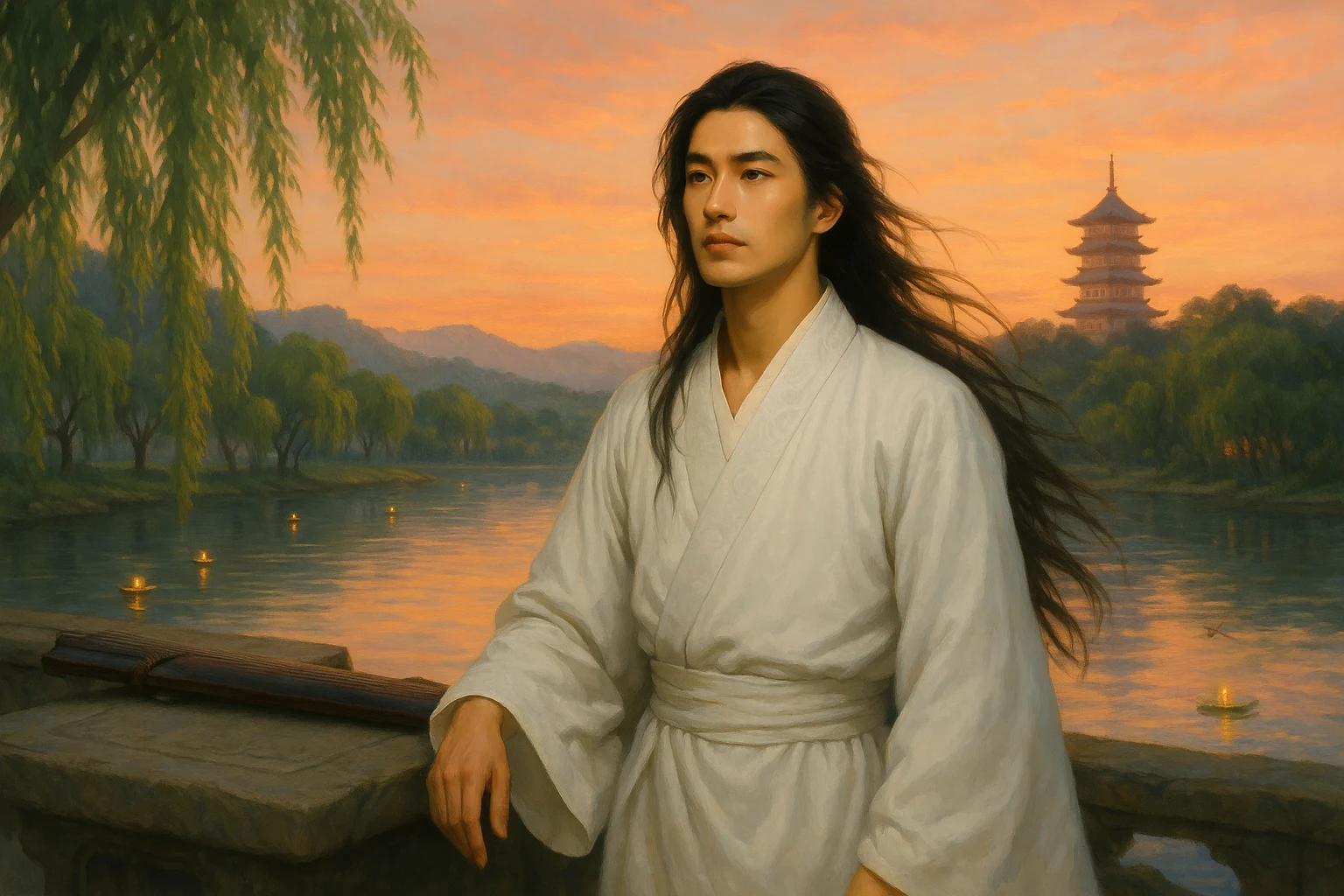
Bai Juyi (白居易), 772-846 AD, was originally from Taiyuan, then moved to Weinan in Shaanxi. Bai Juyi was the most prolific poet of the Tang Dynasty, with poems in the categories of satirical oracles, idleness, sentimentality, and miscellaneous rhythms, and the most influential poet after Li Bai Du Fu.


